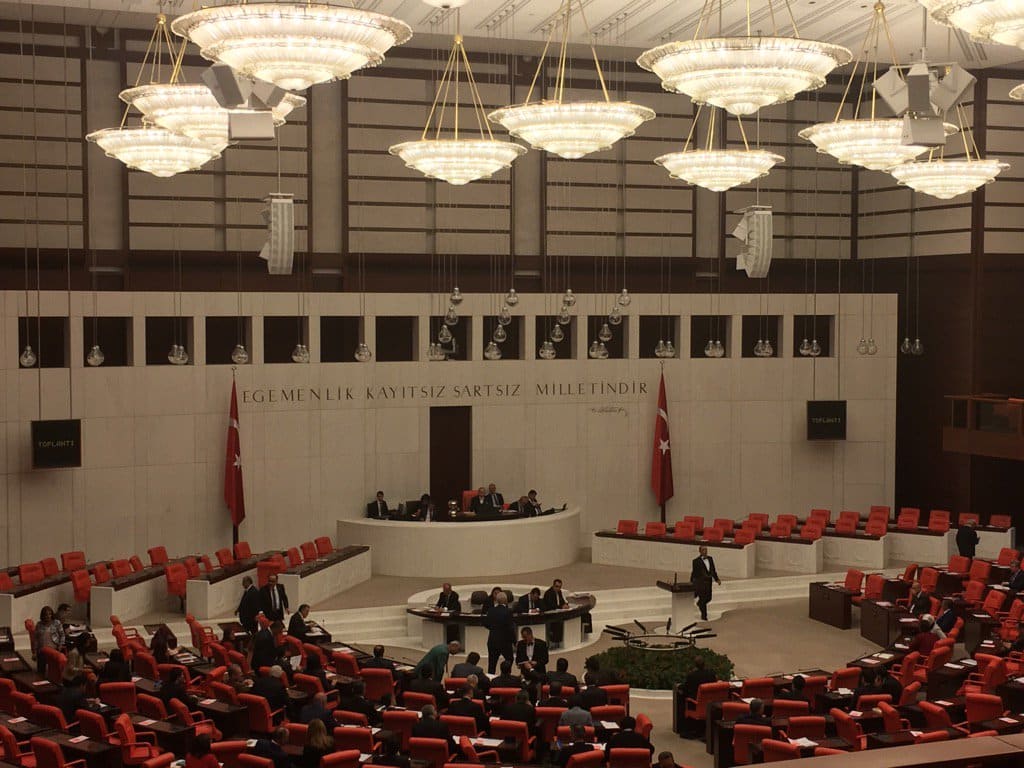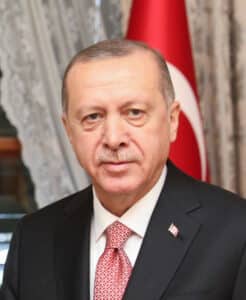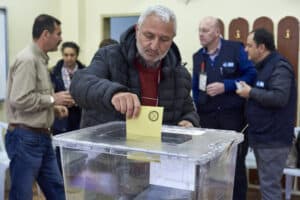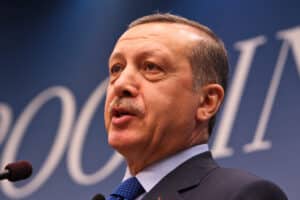While at the same time Turkey’s President Tayyip Erdogan pledged to strengthen freedom of expression and rights to a fair trial in an “action plan”, the crackdown of the pro-Kurdish opposition party, Peoples’ Democratic Party (HDP) continues. Several HDP lawmakers have been accused of having close ties with the Kurdistan Workers’ Party (PKK). It is designated to be a terrorist organization by among other actors Turkey, the European Union (EU) and the United States (US). The pressure on the HDP has intensified over the last weeks. The question of links between the HDP and PKK has been taken to the judiciary. There is a possibility that the HDP will be dissolved, which is not an uncommon practice in Turkish politics. It appears as though this decision will not so much be made by the judiciary itself, but will be more about whether this is in Erdogan’s political interests.
HDP thorn in the eye of Erdogan’s AKP
Since 2015 the HDP has been represented in Turkish parliament, after breaking the 10% electoral threshold. Hereby the HDP stripped Erdogan’s Justice and Development Party (AKP) of its majority in parliament. The AKP has since then been relying on confidence and supply support on the right-wing conservative party, the Nationalist Movement Party (MHP). This frustrating by itself for the AKP, but with the pro-Kurdish minority party, the HDP, entering parliament, Erdogan found himself having to deal with a fierce opponent to his rule. As a minority group in Turkey the Kurds have traditionally had a strenuous relation with Ankara.
After the 2016 attempted coup, the Turkish government has jailed thousands of public servants and soldiers. A purge on those connected to the Gülen movement has been taking place since the government declared Turkey to be in a “state of emergency”. However, the Kurds were targeted as well. Co-deputy chair of the HDP, Salim Kaplan, said that 20.000 members and executives of her party have been taken into custody, with more than 10.000 been sent to jail. At the same time, since August 2019, the government has dismissed the election of HDP mayors. 37 HDP mayors have been arrested and government trustees were appointed to 48 municipalities. International actors have condemned the actions of Erdogan’s government, but this has had little impact so far.
Increased pressure on HDP after PKK execution
After 13 hostages, among whom several Turkish military and police personnel, were killed by the PKK in February, the pressure on the HDP intensified. Nine HDP lawmakers are accused of having a connection with the protests that erupted in Turkey as a response to the Islamic State attack on the Kurdish-inhabited Syrian town of Kobani in 2014. The protests led to the death of 37 people. AKP Parliament Speaker Mustafa Sentop told it was “saddening” to have to deal with many dossiers including charges of “manslaughter”, “spreading terrorist propaganda” and “provoking hatred”. The HDP continues to deny that it has any connection with the PKK. HDP co-leader Pervin Buldan, who is accused herself for being involved in the protests, has stated that Erdogan’s party has begun to attack the HDP “from all directions”.
Responses of other parties to HDP allegations
The parties in parliament have responded in different manners to the accusations. The right-wing party MHP, which supports the AKP, has backed up the accusations. With its leader Devlet Bahceli stating that the HDP’s closure is “urgent, vital and mandatory”, its party’s position is perfectly clear. Bahceli also called for measures to prevent the HDP from re-establishing itself under a different name. This was a response to HDP officials stating that they had a Plan B, Plan C, as well as a Plan D, in order to continue their fight. Re-establishment of parties has happened before and is not uncommon in Turkish political history. The other nationalist opposition force in parliament, the Good Party (iYi), has been much more cautious in its response. Its party leader Meral Akşener has stated that it would “probably vote yes” in case the question of the HDP’s shutdown comes to parliament, after it is reviewed by the judiciary first.
Turky’s largest opposition party, the Republican People’s Party (CHP), opposes the shutdown of the HDP. Its party leader Kemal Kılıçdaroğlu stated that “it is no democracy if you punish more than 6 million people by shutting down the HDP”. He accuses Erdogan of punishing those Kurds who did not vote for the AKP in the last elections. At the same time Kılıçdaroğlu believes that the AKP themselves know better than to shutdown the HDP. “In the past party shutdowns have not solved anything”, he stated. In response to the calls of Bahcelli to shut the HDP down, the AKP deputy chair Cahit Özkan has said that the government only hopes that citizens will no longer support the HDP after hearing about these allegations, instead of shutting the party down completely.
Decision of HDP shutdown up to heavily Erdogan influenced judiciary
The AKP has been clear to state that the closure of the HDP is up to the judiciary and that the question whether this will happens is in the law, not in politics. However, as often seen such development have been steered by politics more often than one would wish. The Court of Cassation opened an investigation into the HDP on March 2, but is heavily influenced by Erdogan. Nationalist opposition party MHP is already putting pressure on the Court to decide to shut the HDP down completely. Party officials from the AKP have also spoken out in favour of a shutdown decision by the Court. If the Court would indeed be entirely independent, politicians might be more careful with making such statements about their desired outcome.
At the same time parliament is also looking into whether to lift the parliamentary immunity of 25 lawmakers, of whom 20 are HDP lawmakers. Parliamentary immunity protects lawmakers from being prosecuted without good reason. Opposition leader Kılıçdaroğlu of the CHP has spoken out against this. He stated that “in a country without judicial independence lawmakers have no guarantee aside from immunity”. “If one would strip even that away, immunity is only decided by one person”, referring to President Erdogan. The decision, whether the HDP will be shut down and the immunity of HDP lawmakers will be lifted, seems to lie with Erdogan’s party. This means that a dilemma is evolving for Erdogan, as he has to think carefully whether a complete HDP shutdown would be in his interests.
HDP crackdown as a distraction to Turkey’s economic situation
The new chapter in the HDP crackdown that is evolving has everything to do with Erdogan’s declining support. Turkey is currently facing an economic crisis, which is affecting declining vote shares for the AKP and several party defections have occured as a consequence. Turkey’s shaky economy is characterized by a plunging currency, rising inflation and high unemployment. In an October poll by Avrasya only 32.5% of voters stated they would support the AKP, while support for the CHP had already increased to 28%. Other polls still predict Erdogan will recieve over 40% of the votes, but Erdogan’s lead is narrowing. In an effort to distract from such developments, Erdogan has raised the alleged links between the HDP and PKK once again.
Erdogan and his AKP are seriously being challenged by the CHP and Kılıçdaroğlu, who hopes to become Turkey’s next President. The CHP and other opposition party iYi have formed the Nation Alliance, with which the parties hope to counterbalance Erdogan’s People’s Alliance of the AKP and MHP. By bringing the alleged links between the HDP and terrorist group PKK, Erdogan hopes to create a rift between the Nation Alliance partners, the CHP and iYi. The iYi was founded by Akşener, who broke away from the MHP, and as a nationalist party is expected to “speak out” against terrorist group PKK, as well as its links with the HDP. Meanwhile, the social-democratic CHP is fierce opponent of further crackdown the HDP. This explains the cautious and undecided response of iYi so far.
The dilemma of Erdogan about the HDP
On the other hand, with a potential shutdown of the HDP, Erdogan would lose a national scapegoat that he might need in a time of decreasing support for his government. Given the increasing pressure on Erdogan’s regime, internationally and domestically, the question on whether to shut down the HDP might be a crucial one. Erdogan is also already under high pressure of the EU and US and recently raised its commitment to the upholding of human rights, in a bid to make-up with the West. With President Joe Biden replacing Donald Trump, who regularly went out of his way, Erdogan faces full pressure from the White House again. Shutting down an entire opposition party will only lead to more critical notes from the West.
The AKP has stated that the possibility of the HDP closure is “pretty high”. There might be some truth to this, considering Turkey’s long tradition with banning political parties and the AKP’s interest in banning the second largest opposition party in parliament. Even though the AKP might say it is “up to the judiciary” now, Erdogan will be in discussion with his party what the best course of action will be. He has yet to decide whether the HDP will be completely shut down, or whether he would simply continue waging war against the HDP with other means. What might be crucial is how the public reacts to a possible HDP closure, as it is votes that decide whether Erdogan can remain in power in the end.
Sources: Aljazeera, Anadolu1, Anadolu2, Anadolu3, ANF, ArabNews, AP, DailyNews, ForeignPolicy, France24, HRW, Independent, NewEurope, NYTimes, Reuters1, Reuters2, Reuters3, Reuters4, Reuters5, Rfi, Duvar1, Duvar2, Duvar3, Duvar4
Image: Wikimedia (Turkish parliament)



